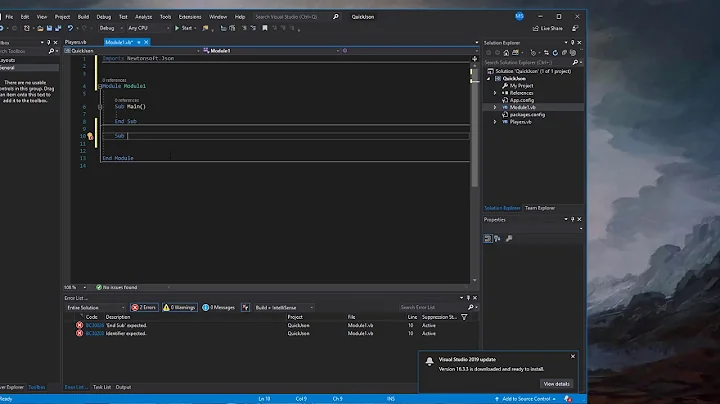Json.net deserialization is returning an empty object
Solution 1
When you serialized your SplunkDataModel to JSON, you wrapped it in an object with a summary property. Hence, when you deserialize the JSON back to objects, you need to use the same structure. There are several ways to go about it; they all achieve the same result.
-
Declare a class to represent the root level of the JSON and deserialize into that:
public class RootObject { public SplunkDataModel Summary { get; set; } }Then:
var deserialized = JsonConvert.DeserializeObject<RootObject>(contents).Summary; -
Or, deserialize by example to an instance of an anonymous type, then retrieve your object from the result:
var anonExample = new { summary = new SplunkDataModel() }; var deserialized = JsonConvert.DeserializeAnonymousType(contents, anonExample).summary; -
Or, deserialize to a JObject, then materialize your object from that:
JObject obj = JObject.Parse(contents); var deserialized = obj["summary"].ToObject<SplunkDataModel>();
Solution 2
On my side, it was because I had no public setter for my properties. Instead of having
public class MyClass
{
public int FileId { get; }
}
I should have
public class MyClass
{
public int FileId { get; set; }
}
silly mistake that cost me hours....
Related videos on Youtube
Manish
Developing Android App by night and developing C# application during day,
Updated on September 16, 2022Comments
-
Manish over 1 year
I'm using the code below for serialization.
var json = JsonConvert.SerializeObject(new { summary = summary });summaryis a custom object of typeSplunkDataModel:public class SplunkDataModel { public SplunkDataModel() {} public string Category { get; set; } public int FailureCount { get; set; } public Dictionary<string, SplunkError> FailureEntity { get; set; } public Dictionary<string, string> JobInfo { get; set; } public string JobStatus { get; set; } public int SuccessCount { get; set; } public List<string> SuccessEntity { get; set; } public int TotalCount { get; set; } }Serialization results in the JSON below:
{ "summary": { "Category": "category", "JobStatus": "Failure", "JobInfo": { "Course processing failed": "" }, "TotalCount": 0, "SuccessCount": 0, "FailureCount": 0, "FailureEntity": {}, "SuccessEntity": [] } }Now, for unit testing purposes, I need to deserialize it, but the code below is returning an object with empty values. Where am I going wrong?
var deserialized = JsonConvert.DeserializeObject<SplunkDataModel>(contents); -
 Ashkan S almost 5 yearsAKHHHH! OMG! Thanks!
Ashkan S almost 5 yearsAKHHHH! OMG! Thanks! -
 Hamit YILDIRIM almost 5 yearsright in my case there is internal public string Currency { get; internal set; }
Hamit YILDIRIM almost 5 yearsright in my case there is internal public string Currency { get; internal set; } -
Angel Yordanov about 4 years@HamitYILDIRIM Aaargh... i pulled half my hair until i read your comment, thanks alot!
-
 Hamit YILDIRIM about 3 yearsI dont know your code but there should be a problem interesting your code scope. Asynchronous function have to know that function call completed and ready to deserialize. For example you can use it in an arrow function @PhilNicholas
Hamit YILDIRIM about 3 yearsI dont know your code but there should be a problem interesting your code scope. Asynchronous function have to know that function call completed and ready to deserialize. For example you can use it in an arrow function @PhilNicholas -
 Phil Nicholas about 3 yearsI faced the same problem as @HamitYILDIRIM DeserializeAsync would not map JSON properties with
Phil Nicholas about 3 yearsI faced the same problem as @HamitYILDIRIM DeserializeAsync would not map JSON properties with{ get; internal set; }I decorated the properties with the[JsonInclude]attribute and everything worked as expected. -
StingyJack about 3 yearsIf anyone is wondering, setting InternalsVisibleTo for the Newtonsoft.Json library doesnt fix this.




![Serialize and Deserialize Json to C# [Step By Step Tutorial of JSON in C#]](https://i.ytimg.com/vi/hLYHE1kIOpo/hq720.jpg?sqp=-oaymwEcCNAFEJQDSFXyq4qpAw4IARUAAIhCGAFwAcABBg==&rs=AOn4CLCwFkI7YDaizcmvb-xMAdIPTDYX-A)




